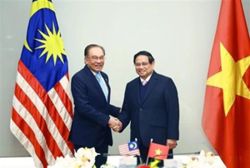
Keep it flowing: Fadillah symbolically pouring water onto a plant to officiate FLOW 2024 in Kuala Lumpur. Flanking him are UN Global Compact Network Malaysia & Brunei executive director Faroze Nadar (right) and Karima. — Bernama
KUALA LUMPUR: The country has the moral duty to tackle its water challenges head-on or it will end up with a major water crisis in the future, says Deputy Prime Minister Datuk Seri Fadillah Yusof.
Fadillah, who is also Energy Transition and Water Transformation Minister, said that although Malaysia boasts one of the most advanced water infrastructures in the region, water transformation should be continuous to ensure its sustainability for future generations.
“A pressing challenge lies in ensuring a continuous and adequate water supply, especially in drought-stricken regions, where existing water resources face heightened pressure. This poses significant reliability challenges for domestic, agricultural and industrial needs.
“Simultaneously, intense rainfall and flooding events pose risks to water infrastructure, disrupting supply chains and compromising water quality,” said Fadillah at the Future Leaders of Water Sustainability Symposium (FLOW) 2024 here yesterday.
He said there is an urgent need for climate-resilient water management strategies and guarding water against pollution due to industrial discharge and agricultural runoff.
“Water security transcends mere access to clean water; it embodies a commitment to social justice and ecological integrity.
“Similarly, Malaysia also faces significant challenges regarding drinking water quality and availability, highlighted by past water disruption incidents due to pollution.
“These challenges are not just statistics but represent individuals and communities directly impacted by water scarcity and pollution. Therefore, it is imperative to recognise the voices of those affected and address their needs effectively,” said Fadillah, pointing out that the financial toll of water scarcity looms large.
The Deputy Prime Minister also launched the Forward Faster for Water Resilience initiative in Malaysia with Duopharma Biotech Bhd being the first local signatory.
Duopharma Corporate chief executive officer Anas Alam Faizli shared how the company has been conserving and treating water through simple acts such as doing away with dual urinal flushing.
The Forward Faster initiative aims to increase accountability and transparency by calling for companies to publicly declare their commitments and highlight the actions they will undertake to meet the targets.
Companies committed to the targets will be required to report on progress annually to the UN Global Compact.
At the same event, the United Nations Resident Coordinator in Malaysia, Brunei Darussalam and Singapore, Karima El Korri said that water availability does not mean that the water is well managed.
“There are 1.1 billion people worldwide still lacking access to clean water and this is intimately linked to poverty, health and nutrition issues. Global data show that girls and women spend 200 million hours every day to collect water,” she said.
Bank Negara Sustainability Unit deputy director Suraya Sani pointed out that there are nature-related financial risks should there be compromises in water sustainability.
She said ecosystems play a vital role in affecting the depreciation of natural assets, which may contribute to financial losses among banks.
The one-day symposium was also attended by Subang Jaya state assemblyman Michelle Ng Mei Sze and National Water Services Commission chairman Charles Santiago.








































